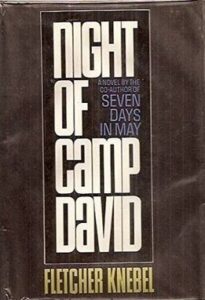 1965:
1965:
Fletcher Knebel veröffentlicht einen Thriller, in dem der US-Präsident plötzlich mit seinen NATO-Partnern brechen möchte und eine Annäherung an den Kreml anstrebt. Der Beweis, dass er gänzlich den Verstand verloren hat: Er will auch Kanada annektieren.
Leseprobe:
Chapter 1 – After Midnight
Jim MacVeagh’s burst of laughter came so unexpectedly, his hand jiggled the stem of the wineglass, and a splash of champagne spotted the linen tablecloth. Sidney Karper, the Secretary of Defense, sitting on his right, grinned in shared appreciation and shook his head.
„Unbeatable, isn’t he, Senator? He just won’t be topped.“
„Nobody can touch him when he’s determined,“ agreed MacVeagh. He wiped at his eye with a corner of his napkin and turned back toward the center of the long head table, cluttered with late debris of ashes and crumpled menus amid the sparkle of glassware.
The speaker, President Mark Hollenbach, was mock-solemn again after flashing a responsive smile for the spray of laughter which greeted his first sally. His was the honor chore of the night—the brief reply to the toast to the President of the United States which signaled the closing of another annual Gridiron dinner. The newspaper correspondents had lampooned the Hollenbach administration and its foes in a series of musical skits, some sharp as stilettos but one belabored in its buffoonery, while the Marine Band orchestra in shining scarlet coats played for the 550 diners.
Behind the President hung the emblem of the club which had satirized every White House occupant since Benjamin Harrison. It was a huge, illuminated, rose-festooned gridiron, patterned on the type used by nineteenth-century housewives for roasting over a wood fire. Before Hollenbach sat the elite of America’s delicately interwoven political-industrial society, the men who ran the political parties and the big corporations. These were men whom, for the most part, the President called by their first names. They were mellowed now by the whisky and wines, the terrapin and the filet mignon chateaubriand, yet they sat watching him attentively in the manner of that always vigilant breed, the President-watchers. Yes, he was on trial, as ever, and the long rows of roses and daffodils, the shimmering silver and wineglasses, the amiable droop of white ties and once stiff shirt bosoms, did not deceive him. It was 11 P.M., and the faces turned toward him beamed like pumpkins on a vine. The men of wealth thought the fare deserved well of them, and even those who had rented their white-tie-and-tails for $15 shared a sense of wellbeing. It was at just such an hour of camaraderie that an average man would lower his guard. But not President Hollenbach. He could never afford to be bested.
„As you know,“ he resumed, „one of my closest advisers is renowned for his abstinence.“ He paused. Timing was of the essence in a speech of witticisms. „The worst part about being a teetotaler like Joe is that when he gets up in the morning he knows he already feels as good as he’s going to feel all day.“
Another roll of mirth. Mark Hollenbach smiled, and Jim MacVeagh thought he detected a touch of vindication in the smile. The gag was an old one—used years before by Governor George Romney of Michigan—and MacVeagh knew that Hollenbach’s speech man had tried to dissuade him from using it. But Hollenbach ruled that it would sound fresh on the lips of a President. It did. MacVeagh glanced again at Sidney Karper beside him, but the Secretary of Defense was not smiling. Instead, he seemed absorbed in a study of the President. Karper’s huge head, with the prominent beak and the bronze tint of the skin, reminded MacVeagh of a profile of an American Indian. He had to crane his neck to get an unobstructed view of the President past Karper.
„I am delighted to be here this evening,“ said President Hollenbach, „and hear the nation’s leading newspapermen tell the truth about me—for a change.“ More laughter. Hollenbach kept his face blank this time. „I was especially heartened to see my friends, the Republicans, laughing. . . . They don’t often succumb to attacks of good humor, you know. Of course, tonight, they never quite got around to laughing at themselves. For a Republican to laugh at himself requires a severe psychological upheaval. Still, tonight, they laughed at me—and that’s a start. After all, they have to begin somewhere. I have great faith in this country, and I’m confident that someday, somewhere, somehow, a Republican is going to break out in a big, hearty guffaw, just for the fun of the thing.“
The President paused and took a sip of water. “The Republican capacity for solemnity constantly mystifies me. Perhaps the clue lies in what they say to one another. I’ve often wondered what Republicans talk about in the cloisters of their own minority clan. I’ve given the matter a great deal of thought, and I think I’ve hit on a way to find out. May I advance a suggestion for your consideration? . . .
„I propose,“ he said after a brief hesitation, „that the FBI be empowered to maintain an automatic tap on all telephones in the country. The tremendous advantages for crime detection are, of course, obvious. On the other hand, no decent, law-abiding citizen would have anything to fear, since nothing he said could be of interest to a federal investigative body. But-and here’s the point-with a standing wiretap, we Democrats could learn what mysterious substance provides the glue for Republicanism, what indeed it is they say to one another that makes them so gloomy.“
There was a ripple of tittering among the diners and a few laughs. Jim MacVeagh, grinning, turned to Sidney Karper.
„He’s really soaring, isn’t he?“
The Defense Secretary did not smile. „Even in fun,“ he replied, „that’s a chilling suggestion.“
MacVeagh eyed his seatmate in surprise, and was about to protest, but another presidential thrust brought a wave of laughter that carried MacVeagh back into the current of Hollenbach’s talk.
„. . . and so,“ the President was saying, „let’s agree that life is short enough without waiting around for the day Republicans begin to enjoy themselves. For real humor, for that earthy gusto of the people, we must tum to my own party and to the White House where, I concede, some strange things have been happening.“
On a tide of chuckles, Mark Hollenbach was off on five minutes of pungent commentary on his own administration. His stories were barbed, yet salved in an after-dinner lubricant of self-derogation, and when President Hollenbach sat down, 550 men rose to their feet and applauded him. The rows of white-vested stags locked arms and sang „Auld Lang Syne“ in mottled harmony. The 91st annual Gridiron dinner was over.
The Marine Band struck ruffles and flourishes and swung into „Hail to the Chief.“ Hollenbach walked down the long head table, bracketed by two Secret Service men. When the President saw Senator MacVeagh, he leaned over and whispered to him.
„Come on over to the house in a few minutes, Jim. I want to talk to you. I’ll buy you a nightcap.“
„Be honored, Mr. President,“ said MacVeagh.
Hollenbach quickened his pace and at the door of the broad Statler Hilton mezzanine lobby, he was swallowed by a new brood of Secret Service agents. The buzz of conversation in the banquet hall rose in volume, then fractured into clattering fragments as the diners bunched at the exits on their way to the after-dinner drinking rooms. MacVeagh found his host, columnist Craig Spence, and thanked him for the evening. Spence’s fringe of red hair sat on his otherwise bald head like a tiara of poinciana. He wobbled slightly as he shook hands.
„Come on up to 1240,“ said Spence. „It’s open house all night.“
MacVeagh shook his head. „Thanks, Craig, but I need air. You wined and dined me too well.“
The junior senator from Iowa…
Quelle: Amazon
